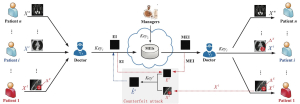We are glad that the paper was accepted for publication in SCSA Journal. The journal covers research in smart computing systems and applications, with a focus on next-generation networking, cloud, and edge computing solutions.
Authors: Stojan Kitanov, Dragi Kimovski, Fisnik Doko, Kurt Horvath, Shpresa Tuda, Blerta Idrizi
Abstract: The rapid proliferation of IoT devices, coupled with the generated exponential growth of data, has necessitated the development of advanced network architectures. As a result, 5G mobile networks have already begun to face challenges such as network congestion, latency, and scalability limitations. Therefore, the need for a robust and future-proof solution becomes increasingly evident. In this direction, many research initiatives and industrial communities started to work on the development of 6G mobile networks. On the other hand, the emerging concept of Computing Continuum encompasses the seamless integration of edge, fog, and cloud computing resources to provide a unified and distributed computing environment, and it aims to enable real-time data processing, low-latency response, and intelligent decision-making at the network edge. The primary objective of this research paper is to address the shortcomings of existing network infrastructures and to overcome these shortcomings by integrating advanced AI capabilities in 6G mobile networks with the Computing Continuum. Moreover, it would be proposed a Computing Continuum Middleware for Artificial Intelligence over 6G networks, which would offer high-level and well-defined (“standardized”) interfaces which would create an automated, sustainable loop for managing IoT applications utilizing AI approaches over 6G networks.





